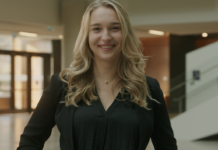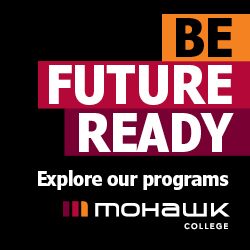Two years of disruptions caused by the pandemic have taken their toll on high school students who are now navigating the next step in their learning journey: higher education.
Business schools, known for teaching the application of theoretical skills to solve real-world problems, are capitalizing on the strategic opportunity before them by providing an enhanced level of support to prepare current and incoming cohorts for long-term success.
Brock University
There’s an extra emphasis this year on connectivity, developing engagement, and highlighting extracurricular and experiential learning opportunities for students, says Barry Wright, Interim Dean at the Goodman School of Business.
“It’s been a difficult couple of years and there’s no question that students’ mental health has suffered,” explains Wright. “But there is excitement to embrace a new way of doing things, and the energy is there. We are helping students develop in areas that perhaps they haven’t had the opportunity to grow in the last couple of years.”
Brock’s business school offers students a robust range of volunteer, co-op, and work-integrated learning opportunities to build and refine their problem solving skills. Wright says each student has five or six classes where they work as part of a team to solve real-world challenges for community organizations. These extracurricular engagements are tracked on cocurricular transcripts, providing students with a tangible record they can speak to when entering the job market.
Beyond growing business skills, rounding out soft skills and developing effective learning strategies have been identified as crucial factors to student success.
“We’ve worked with our first-year instructors to let them know where the students are coming in at,” says Jennifer Li, Goodman’s Associate Dean of Undergraduate Programs.
Li explains their team is proactively identifying where students may face difficulties and are providing the help required to mitigate challenges.
“Some students, for example, lack skills for writing exams because it’s something they haven’t really done in a couple of years,” says Li. “To help, our instructors are walking students through exams with reminders to pace themselves.”
Wright says creating a sense of safety and community is at the core of Goodman’s strategy.
“Our message to students is do not suffer in silence. We are very open about that. We have a great advising team and extensive supports for mental health.”
Recognizing that it’s often easier for a student to ask another student for help, there are also Goodman Ambassadors – upper year and graduate students – available to offer peer-to-peer coaching and guidance for incoming students.
“Because of our small size, there is a really strong community and camaraderie at Brock. We are Team Goodman,” says Wright. “We teach students to be good teammates and look out for each other.”
Guelph-Humber
Guelph-Humber’s Program Head of Business Justin Medak says students this year are a little more hesitant than their predecessors to speak up in class, ask questions, or engage with in-person events.
“It’s been a tough year, likely due to being at home for two years,” Medak explains. “Lecturing has been one way.”
That’s why there is an intentional focus on supporting students to reconnect with campus life in-person. Professors are emphasizing the importance of extracurricular activities including case competitions, career development, and extensive academic supports such as writing and math centres to help bring out the best in their students.
Guelph-Humber’s dual approach to theoretical and hands-on learning offers the advantage of smaller class sizes – averaging 49 students – where students can more easily engage in dialogue with their classmates and instructors.
There’s also strong support from alumni guest lecturers and a peer mentorship program, offering connections and inspiration for students to build out their skills and resumes.
For the 2023 cohort thinking about their applications, Medak says demonstrating an understanding of the importance of community goes a long way.
“We recognize it has been more challenging to be involved. Application factors beyond grades are considered – anything that shows your ability to multitask and to be part of your community shows resilience to juggle multiple priorities and a set of skills that can be refined in post-secondary and applied in the work world.”









